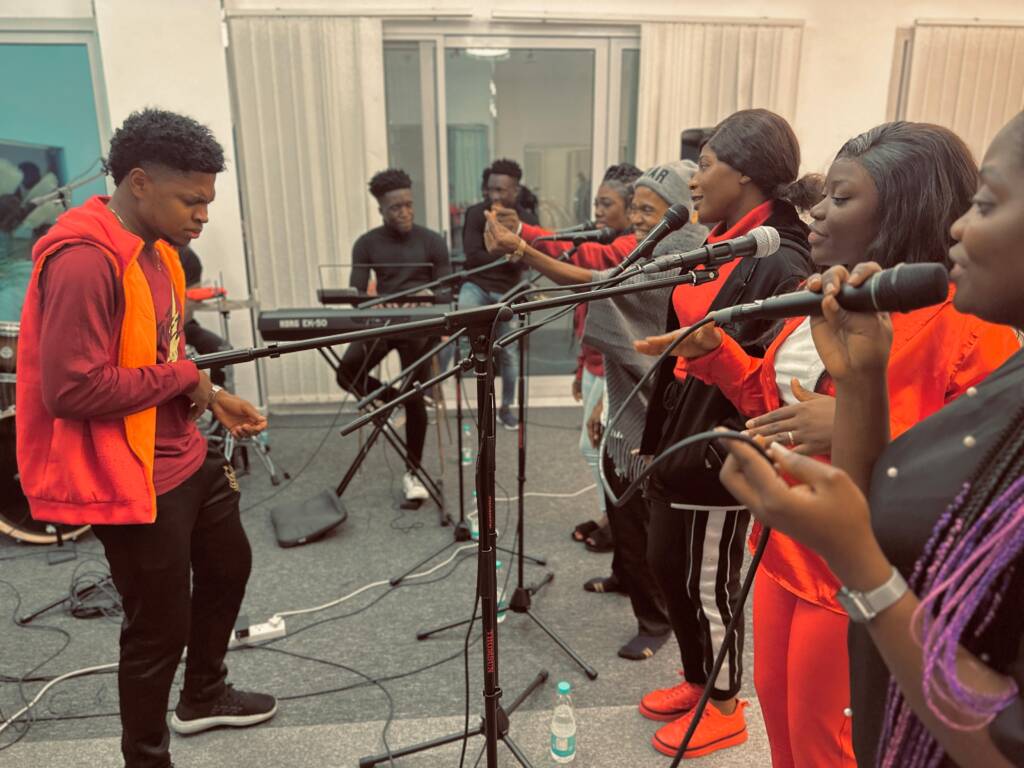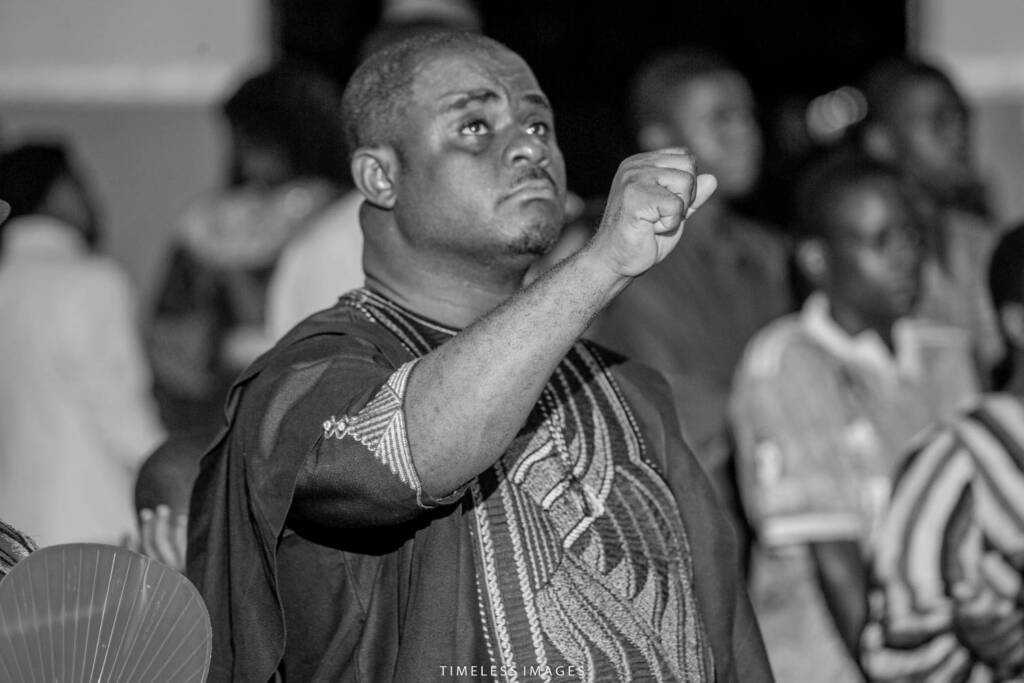
Worship leading involves much more than what most people see on Sunday mornings. The four to five songs in most modern worship services take between 15-40 minutes, but they represent just the small outcome of an entire week or month of background planning and preparation. While music is always performance to some degree, we often find ourselves caught between being artists and pastors—a tension that can lead to exhaustion and burnout.
Despite our musical training, the skills needed to shepherd a congregation are quite different. As worship leaders, we’re not just performing but fulfilling a spiritual responsibility where all church members are called to lift their voices together in praise and prayer to God. To prevent burnout, we need effective worship leading training, intentional preparation techniques, and spiritual practices like prayer before worship leading. In this article, we’ll explore the complex nature of worship leading burnout and provide practical worship leading tips to help you thrive in this meaningful yet challenging ministry.
The dual identity of a worship leader
Every worship leader faces a fundamental identity struggle that goes beyond music. We stand at the intersection of two distinct callings that must somehow work in harmony.
Artist and pastor: balancing both roles
Many of us enter worship ministry with musical training, yet find ourselves navigating the unfamiliar waters of pastoral care. The church needs more than craftspeople, coordinators, and performers—it needs pastoral people to plan and lead worship. Those who excel in this dual role possess a deep knowledge of scripture alongside musical ability. They read books, take courses, and attend conferences to hone both their pastoral sensibilities and artistic skills.
Why worship leading is more than performance
Whenever we step on stage, we’re doing something inherently performative—a hand must be lifted, a mind engaged, and we execute the craft we’ve spent years perfecting. However, our performance isn’t at odds with pure worship; it actually becomes our worship when God is our ultimate audience. The difference becomes evident in the outcome: when performance musicians succeed, all eyes focus on them; when worship musicians succeed, they essentially disappear as all eyes turn toward Jesus.
Understanding your spiritual responsibility
As worship leaders, we carry the profound responsibility of placing words of prayer on people’s lips every time we choose a song or write a prayer. Furthermore, we serve as stewards of God’s Word, controlling aspects of people’s spiritual diets through our choices of scripture readings and themes. Consequently, we must remain broken before the Lord, as pride is incompatible with God’s presence.
This holy calling requires worship leaders to approach their role with intentional preparation. We must prepare our hearts to approach God with His people, prepare leadership for positive change, and organize a sequence of songs that takes the congregation on a spiritual journey. Moreover, effective worship leading becomes a process of letting something happen rather than making something happen—allowing God’s presence to flow naturally rather than manufacturing moments.
The hidden pressures behind the platform
Standing on stage Sunday after Sunday creates pressures that few people outside worship ministry fully understand. The spotlight reveals more than just our musical abilities—it exposes our hearts, our struggles, and our humanity.
The emotional toll of constant visibility
Being constantly visible takes a heavy emotional toll. Most worship leaders I know feel persistent pressure for everything to “go right” during services, slowly shifting our focus toward the measurable and practical aspects of worship instead of the biblical. Additionally, when all eyes are on us, we become acutely aware of our facial expressions, movements, and even our clothing choices. As one worship leader confessed, “I put myself in the place of someone in the congregation and realized how my expressions may come across”.
Managing expectations from church and self
The tension between excellence and authenticity creates a unique burden. Churches often have only one or two paid music staff working mostly with volunteers, yet many attempt to achieve professional-level production comparable to touring worship groups. This unrealistic standard leaves many worship leaders discouraged or depressed.
In fact, this pressure transforms worship from a gathering of believers into something that looks more like a performance when everyone focuses on the platform team doing everything correctly. I’ve found that overthinking, people-pleasing, and comparison can keep our worship expression from being authentic.
The impact of unresolved conflict or criticism
Unresolved conflict and criticism can be particularly devastating. Throughout the years, church music decisions have often brought unresolved conflict, leading to division, heartache, and people leaving churches. As worship leaders, we’re easy targets for criticism about everything from song selection and musical style to tempo, volume, lighting, and even clothing.
The challenge lies in responding appropriately. Criticism will either make you bitter or better—it’s entirely up to you. Although criticism hurts, pride will destroy you. When a worship leader succumbs to pride in the face of criticism, nobody wins except the enemy.
Reclaiming your calling through spiritual practices

Image Source: Jonathan Srock
The path back to ministry vitality often begins in quiet moments with God. When the pressures of worship leading threaten to extinguish our passion, spiritual disciplines become the oxygen that reignites our calling.
Prayer before worship leading as a grounding habit
Many worship leaders have discovered that prayer isn’t just a preparation technique—it’s the foundation of effective ministry. One leader shared, “I began crying out to the Lord for a new rhythm of preparation. One that put my heart and ministering to His heart first before every other detail. It changed everything”. This shift from performing to pursuing God’s presence creates a foundation for authentic worship leading.
Prayer should extend beyond your personal needs. Specifically, pray for your team, the congregation, and for protection against distractions. This approach transforms worship from a performance into a genuine spiritual encounter.
Scripture and silence as tools for renewal
Silence has become an undervalued spiritual discipline in our noisy world. Accordingly, creating quiet spaces allows God to “remind us who He is and who we are in Him”. Through stillness, the Holy Spirit can bring to light burdens we’ve repressed, allowing God’s healing to begin.
First, set aside time to meditate on Scripture related to your worship set. Subsequently, allow the Word to shape your prayers and preparation. This practice grounds your worship in biblical truth rather than emotional manipulation.
How to prepare for worship leading with intention
Intentional preparation means deliberately creating space for God amidst rehearsals and planning. Notably, research shows that “the most important spiritual practices for avoiding burnout are ones that involve mindfulness or contemplation”. Even five minutes of such practices can be beneficial.
A practical approach includes:
- Setting aside time to rest in God’s presence
- Listening to each song multiple times with spiritual attentiveness
- Allowing the Holy Spirit to guide your planning
Reconnecting with your original calling
Your calling isn’t static—it needs regular renewal. Ask yourself: “Is your relationship with the Lord stronger now than it was last year, or when you became a Christian?”. Throughout challenges, remember 1 Peter 5:10, which promises that God “will Himself restore, confirm, strengthen, and establish you”.
The journey back to your calling often begins with acknowledging your need for God’s renewal, followed by intentional spiritual practices that restore your first love.
Building a culture that prevents burnout
Building a sustainable worship ministry requires more than individual spiritual practices—it demands an intentional team culture.
Encouraging vulnerability and honesty in teams
Vulnerability isn’t weakness—it’s the foundation of authentic worship teams. Unlike performance-focused groups, healthy teams create environments where members feel safe to share struggles. As leaders, we must model vulnerability first, sending clear signals that imperfection is acceptable. This contagious openness allows team members to set aside insecurities and focus on serving together. Through this process, cooperation naturally emerges from being vulnerable together.
Training others to share the load
So many worship leaders get stuck leading every single Sunday with no backup, which leads directly to exhaustion and burnout. Look for three qualities when developing new leaders: integrity (love for Jesus), skill (musical ability), and teachability (openness to growth). Beyond musical development, disciple potential leaders by bringing them into your spiritual journey. First of all, establish “why we worship” before addressing “how we worship.”
Creating space for feedback and rest
Implement a firm rule that no volunteer serves more than twice monthly. This creates space for team members to both minister and be ministered to. Similarly, schedule regular “Sabbath nights” where the team gathers for community-building apart from ministry responsibilities. After services, follow up with honest reflection about what felt authentic versus what felt like performance.
Shifting from performance to presence
Prayer shifts our perspective from performance to presence, reinforcing that our role is revering God and serving His people. Authentic worship isn’t measured by musical excellence alone, but by life transformation. Remember that building discipleship into team culture might mean encouraging members to serve together during outreach events or meeting in small groups throughout the month.
Conclusion
Worship leading truly represents a sacred balancing act between artistry and pastoral care. This dual identity creates unique pressures that can lead to burnout when not properly addressed. Many of us enter this ministry with musical training but discover the need for pastoral skills along the way.
Ministry longevity depends on recognizing these pressures early. Constant visibility, managing expectations, and handling criticism require intentional practices rather than simply pushing through challenges. Prayer before worship stands as our most powerful tool for shifting focus from performance to God’s presence. Additionally, scripture intake and silence provide essential renewal for our weary spirits.
Building sustainable worship ministry goes beyond individual practices. Team cultures that value vulnerability, shared leadership, and regular rest create environments where burnout becomes less likely. After all, worship leading was never meant to be a solo journey but a communal experience of guiding people toward God’s presence.
Though worship leading carries unique challenges, it remains one of the most meaningful callings within church ministry. Every time we stand before our congregations, we participate in something far greater than a mere performance – we join heaven’s ongoing worship. Therefore, let us approach this sacred responsibility with both excellence and humility, remembering that our ultimate goal isn’t perfection but pointing people toward Jesus.
Your worship leading matters deeply – not just the visible moments on stage but also the hidden preparation of your heart. When burnout threatens, step back toward spiritual practices that first ignited your calling. God remains faithful to restore, strengthen and establish those who lead His people in worship.
Key Takeaways
Worship leading burnout is a real challenge that stems from balancing dual roles as both artist and pastor, but it can be prevented through intentional spiritual practices and healthy team culture.
• Worship leaders carry dual identity pressures – balancing artistic performance with pastoral responsibility requires both musical skills and spiritual shepherding abilities.
• Hidden platform pressures fuel burnout – constant visibility, managing unrealistic expectations, and handling criticism create emotional tolls that many don’t see.
• Prayer before worship transforms ministry – shifting focus from performance to God’s presence through intentional spiritual preparation prevents burnout and restores calling.
• Build sustainable team cultures – encourage vulnerability, train backup leaders, limit volunteer frequency, and create rest spaces to prevent individual exhaustion.
• Authentic worship prioritizes presence over perfection – success means pointing people toward Jesus rather than achieving flawless musical performance.
Remember that worship leading is ultimately about facilitating encounters with God, not delivering perfect performances. When burnout threatens, return to the spiritual practices that first ignited your calling—God remains faithful to restore and strengthen those who lead His people in worship.
FAQs
Q1. How can worship leaders balance their roles as artists and pastors? Worship leaders can balance their dual roles by developing both musical skills and pastoral abilities. This involves studying scripture, attending conferences, and intentionally preparing both artistically and spiritually for services.
Q2. What are some common pressures that lead to worship leader burnout? Common pressures include constant visibility, managing expectations from the church and oneself, dealing with criticism, and the emotional toll of being in the spotlight. These pressures can shift focus away from authentic worship towards performance.
Q3. How can prayer help prevent burnout in worship leading? Prayer before worship leading can ground leaders in God’s presence, shifting focus from performance to ministry. It helps leaders prepare their hearts, pray for their team and congregation, and approach worship as a spiritual encounter rather than a performance.
Q4. What spiritual practices can help worship leaders reconnect with their calling? Spiritual practices that can help include regular prayer, scripture meditation, intentional silence, and mindfulness. These practices allow for renewal, help leaders ground their worship in biblical truth, and create space for God amidst busy schedules.
Q5. How can worship teams build a culture that prevents burnout? Teams can prevent burnout by encouraging vulnerability, training others to share leadership responsibilities, limiting how often volunteers serve, creating spaces for rest and feedback, and shifting focus from performance to God’s presence. This creates a sustainable environment where authentic worship can flourish.


1 Comment